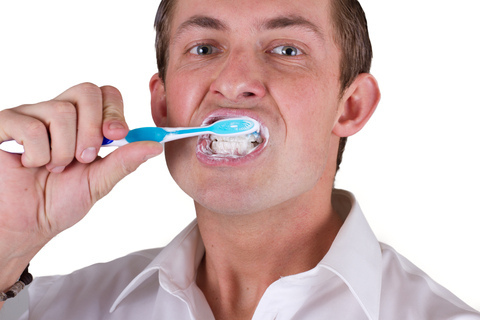Whitening Before Veneers—A Bright Idea?
July 20th, 2022

It’s time. You’ve decided. You’re going to get veneers. Whether it’s to repair a cracked or chipped tooth, to cover discoloration brought on by a root canal or medical condition, to fill in gaps between teeth, or for any other cosmetic reason, veneers can give you back your natural, confident smile.
And now you have just one more decision to make: should you whiten your teeth beforehand?
Many dental professionals find that, for most of us, the best results occur with professional whitening before veneer placement. Why?
- Your veneers will be carefully matched to the teeth surrounding them.
You don’t want your veneers to look anything but natural, and so Dr. Vincent Cardinale and Dr. Chris Moody will make sure that their color is indistinguishable from your other teeth. But there is one important difference between tooth enamel and veneers:
- Teeth are porous.
As hard as it is, enamel is still porous. And the fact that teeth are porous means that teeth can discolor over time. Coffee, tea, red wine, sodas, darkly hued fruits, and fruit juices—teeth readily absorb pigments from foods. And smoking? Not only one of the worst habits for your health, it’s one of the major causes of tooth discoloration. This is the downside of having porous enamel.
The upside? The fact that enamel is porous also means that you can brighten your smile with a whitening procedure.
- Veneers aren’t as porous.
Veneers are generally made of porcelain or a composite resin, with some key differences between them.
Porcelain has a translucent quality that looks like natural enamel, and it is very durable. Porcelain veneers are recommended when teeth have significant chips or gaps. They are also especially stain-resistant.
Composite veneers aren’t as expensive, and usually don’t need as much tooth structure removed to bond them to the tooth. They might not last as long as porcelain, and they aren’t quite as resistant to staining.
When you visit our Naples, FL office, we can discuss the pros and cons to find the perfect veneers for your needs. Just remember,
- Once created, veneers can’t change color.
Veneer color should be considered permanent. If your porcelain veneers seem to have dimmed a bit, often a gentle professional polishing will bring them back to their original shine. Composite veneers, as well, can respond to polishing and cleaning. This is the upside of permanent veneer color.
The downside? Veneers can’t be whitened to match your newly whitened tooth enamel. If you decide to whiten your teeth at a later date, your veneers might appear darker than your surrounding teeth. If you want to change veneer color, you will need to replace your veneers. So . . .
Now that you’ve decided to transform your smile with veneers, take a little extra time to talk to your dentist. Find out if whitening makes sense for you for a perfect, uniform match between your other teeth and your veneers. And then be ready to enjoy your matchless smile!




